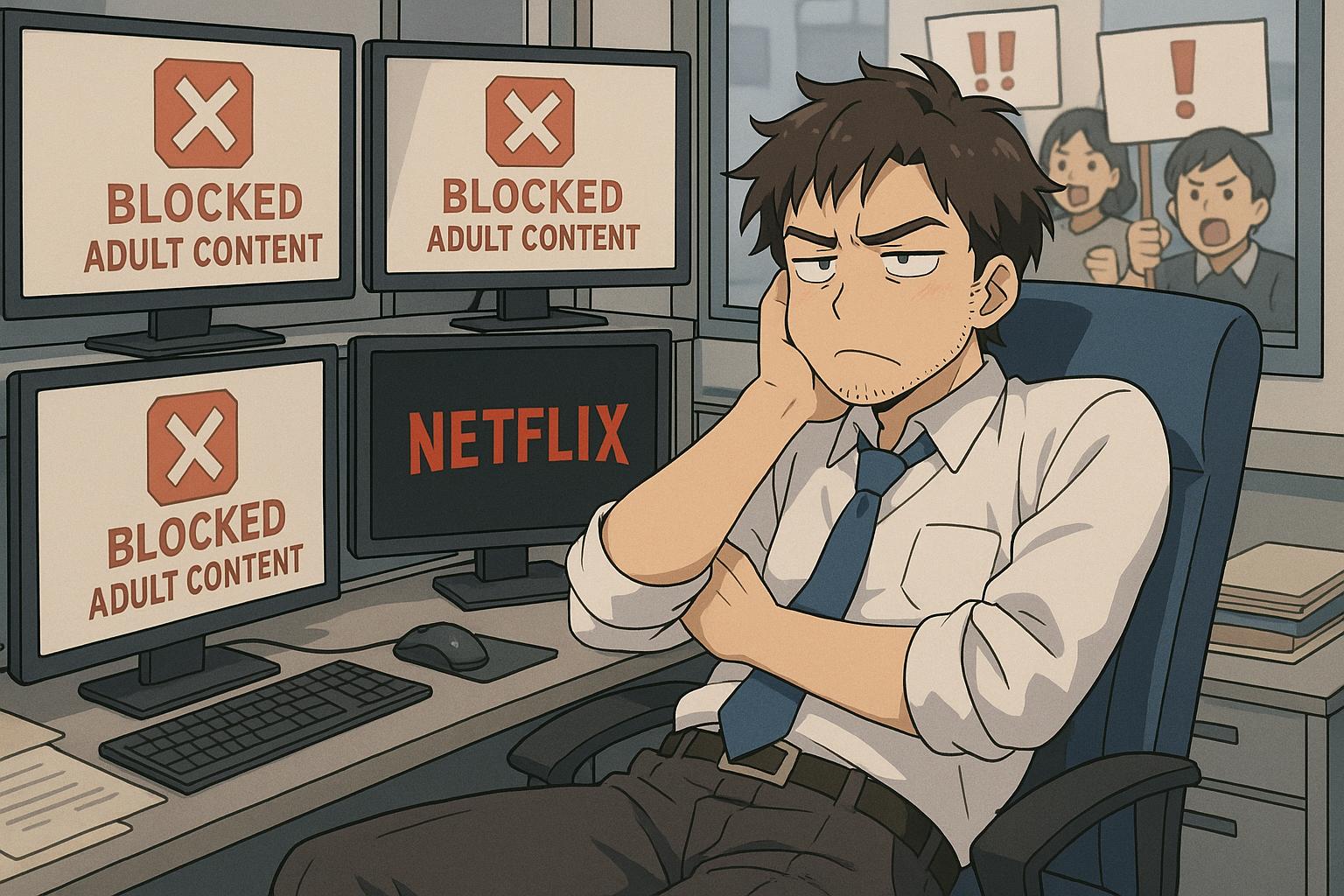Freedom of Information reveals a surge in attempts by Scottish civil servants to watch Netflix and access blocked adult websites during working hours, raising concerns over misuse of public resources amidst growing political discontent and calls for reform.
You might feel a pang of sympathy for the civil servants lounging in their back gardens, contemplating the long hours stretched ahead of them. However, the reality of their work seems to include more than just the mundane tasks of public service. Reports have emerged suggesting that rather than focusing on their duties, many have turned to everyday distractions like streaming Netflix or, more notably, accessing adult websites on taxpayer-funded devices.
Recent revelations indicate a significant number of civil servants indulging in these activities during work hours. The Scottish Mail on Sunday highlighted that the volume of attempts to access Netflix had surged so dramatically that officials were unable to quantify the figures. This information emerged from a Freedom of Information request, suggesting a casual attitude towards public resources amid the ongoing challenges faced by public services.
This pattern of behaviour is not isolated. Investigations have shown that across various councils, including those in Aberdeen and Moray, attempts to access adult websites have been recorded, although these attempts were successfully blocked. Angus Council, for instance, documented six attempts to reach Pornhub, with Highland Council reporting even more. The IT departments assert that such blocks are part of routine operations to ensure effective firewall management, and notably, none of the attempted accesses occurred during working hours.
Adding to this troubling picture is the backdrop of political discontent with senior figures in the Scottish government. In a notable incident, Michael Matheson, formerly the Health Secretary, incurred nearly £11,000 in data roaming charges while using government-issued devices during a private family holiday. This incident, which he initially attempted to claim as a parliamentary expense, led him to resign amidst public outrage. This scenario crystallises a recurring theme, wherein civil servants, instead of serving the public interest, appear to exploit the system for personal gain.
In a climate of increasing scrutiny, the Scottish Government maintains that their firewall systems effectively block all access to pornographic websites from government-issued devices, thus ensuring no connections were made. The government has adopted a rigorous approach to web access policies, categorically blocking sites deemed inappropriate while keeping extensive logs for audit purposes. Interestingly, these logs do not retain data on blocked categories due to the overwhelming volume generated, creating a gap in accountability.
Furthermore, civil servants have faced significant pay increases in the past amid economic turmoil, which many observers deemed deeply inappropriate. For instance, after the onset of the pandemic, it was reported that some public sector workers received inflation-busting pay hikes of up to 12%, condoned by then Finance Secretary, Kate Forbes. Such financial decisions, coming on the heels of pressing budget deficits and cuts to essential services, have drawn ire from the public and opposition alike.
While civil servants enjoy generous remuneration and seemingly ample leisure time, substantial issues in public service management loom large. Reports indicate that the civil service in Scotland has expanded dramatically, growing over 70% since 2016, costing taxpayers more than £600 million annually. By contrast, essential public services are reportedly deteriorating under the weight of bureaucracy and alleged mismanagement.
Frustrations are mounting among civil servants regarding recent directives mandating a return to the office for 40% of their working hours. Many feel this is an undue burden, complaining about heightened commuting costs and framing the request as infringing on their rights. This contretemps highlights a rift between governmental expectations and the realities faced by civil servants, many of whom have enjoyed the benefits of remote work during the pandemic.
The Scottish public appears increasingly disillusioned with these developments, which paint a grim picture of prioritisation and political will. As businesses struggle to stay afloat and taxpayers bear the brunt of rising costs, the disconnect between the governing elite and the citizens they purport to serve has never been more pronounced. Civil servants’ forays into leisure during work hours symbolise a deeper malaise within a system that is grappling not just with operational issues but with a questionable commitment to public service.
In a climate where economic hardship is a prevalent theme, the deep-seated culture of entitlement among civil servants has begun to clash openly with the struggles of everyday people. The serious failures of the current administration—seen in botched policies and lack of accountability—underscore the urgent need for reform. As calls for a more transparent and responsible government grow louder, the public awaits a meaningful demonstration of care from those positioned at the helm of Scotland’s civil service.
Reference Map:
1. Paragraphs 1, 2, 3, 4, 5, 6
2. Paragraph 3
3. Paragraphs 4, 5
4. Paragraph 4
5. Paragraph 2
6. Paragraph 2
Source: Noah Wire Services
- https://www.dailymail.co.uk/news/article-14728695/GRAHAM-GRANT-Binge-watching-Netflix-gorging-public-money-laptop-civil-servants-grossly-bloated-state.html?ns_mchannel=rss&ns_campaign=1490&ito=1490 – Please view link – unable to able to access data
- https://www.pressandjournal.co.uk/fp/news/aberdeen-aberdeenshire/6650202/access-denied-just-who-is-trying-to-watch-x-rated-content-on-council-servers/ – In 2024, an investigation revealed that council staff in Aberdeen, Aberdeenshire, and Moray attempted to access adult websites on work computers. Angus Council blocked six attempts to access Pornhub, while Highland Council blocked 15 attempts, including nine for Pornhub and six for Xvideos. The councils’ IT departments stated that these blocks were part of routine checks to ensure effective firewall operations, and no staff members were found to have accessed inappropriate content during work hours.
- https://www.gov.scot/publications/scottish-government-devices-that-browsed-pornographic-websites-foi-release/ – A Freedom of Information request revealed that the Scottish Government’s firewall system effectively blocked all attempts to access pornographic websites from government-issued devices. The system categorizes and blocks such sites, ensuring zero connections to pornography. The Scottish Government retains extensive web access logs for audit purposes but does not store data on blocked categories due to the large volume of information.
- https://www.gov.scot/publications/foi-202100252568/ – The Scottish Government’s web access policies block all connections to websites categorized as ‘Pornography’ by their perimeter technology. Between May 7, 2021, and the date of the response, there were zero connections made to such sites from networks in Scottish Government buildings. The government does not store data on blocked categories due to the high volume of web access logs generated.
- https://www.scotsman.com/news/politics/council/council-staff-tried-to-access-pornography-and-gambling-websites-3116462 – Between June 1 and November 30, 2020, Edinburgh City Council staff attempted to access restricted material, including gambling, pornography, and social media sites. The council’s IT providers blocked access to these categories to protect staff and systems. The council emphasized adherence to its ICT acceptable use policy and stated that any identified attempts to access inappropriate sites would be investigated, with appropriate disciplinary action taken.
- https://en.wikipedia.org/wiki/Michael_Matheson_iPad_scandal – In late 2023, Michael Matheson, then Cabinet Secretary for NHS Recovery, Health and Social Care in Scotland, incurred nearly £11,000 in data roaming charges after taking a Scottish Parliament iPad on a family holiday to Morocco. Matheson initially attempted to claim the charges as a parliamentary expense but later admitted that the iPad had been used by his sons to stream football matches. He agreed to personally pay back the full cost of the bill and resigned as Health Secretary in February 2024.
- https://www.theguardian.com/politics/2004/aug/27/uk.technology – In 2004, the Department for Work and Pensions (DWP) admitted that hundreds of civil servants had been disciplined for downloading pornographic images. The Sun newspaper alleged that staff had accessed over two million pornographic images in eight months, including 18,000 involving children as young as 13. The DWP conceded that more than a million images might have been accessed and that 227 staff had been disciplined for serious misconduct related to accessing porn from government computers.
Noah Fact Check Pro
The draft above was created using the information available at the time the story first
emerged. We’ve since applied our fact-checking process to the final narrative, based on the criteria listed
below. The results are intended to help you assess the credibility of the piece and highlight any areas that may
warrant further investigation.
Freshness check
Score:
6
Notes:
The narrative references Michael Matheson as ‘formerly the Health Secretary’ following a scandal involving data roaming charges and resignation, events that happened around 2021-2022, indicating some dated context. The mention of pandemic-related pay rises and remote work debates similarly situates much content in the recent past rather than breaking developments. No clear evidence is found that this exact content is a recycled press release, but its framing and details suggest it is reflecting on events gathered over at least the past few years rather than brand new information.
Quotes check
Score:
4
Notes:
There are no direct attributable quotes from identifiable individuals in the narrative; rather, it paraphrases official positions and reported events. The mention of Michael Matheson and statistics on website blocking are presented as reported facts, not direct speech. This absence of verifiable original quotes lowers the score as no earliest source or direct verification is possible. It may imply original reporting or editorial commentary without direct quotes.
Source reliability
Score:
5
Notes:
The narrative originates from the Daily Mail, a widely known UK publication with broad reach but a mixed reputation for sensationalism and politicised framing. While it is a major news outlet, it is not generally considered the highest standard for impartiality or thorough investigative journalism, especially on politically charged topics. Therefore, the reliability is moderate but should be considered cautiously.
Plausability check
Score:
7
Notes:
The claims about civil servants attempting to access leisure or adult sites on government devices and the cited IT firewall blocks are plausible and consistent with known workplace IT monitoring practices. The reference to Michael Matheson’s resignation over roaming charges is a documented event. The reported pay rises and workforce expansion align with known public sector trends post-pandemic, though exact figures and characterisation of motivations are harder to independently verify. The overall scenario is believable but presented with a strong editorial tone that emphasises a negative interpretation.
Overall assessment
Verdict (FAIL, OPEN, PASS): OPEN
Confidence (LOW, MEDIUM, HIGH): MEDIUM
Summary:
The narrative discusses mostly verifiable events but with some dated context and without direct verifiable quotes, coming from a known but somewhat partisan publication. While the claims are plausible and consistent with public knowledge, the framing is editorialised and lacks fresh, exclusive information. Further verification from more impartial or official sources would be needed to fully confirm all details and claims.













